1. Overview
Viktor Felixovich Vekselberg (Виктор Феликсович ВексельбергViktor Feliksovich VekselbergRussian; Віктор Феліксович ВексельбергViktor Feliksovich VekselbergUkrainian), born on April 14, 1957, is a prominent Russian-Israeli businessman and oligarch. He is the founder and chairman of Renova Group, a major Russian conglomerate with diversified interests. Vekselberg's fortune was estimated at 9.30 B USD as of November 2021, ranking him as the 262nd richest person globally, though earlier estimates placed it at 11.40 B USD in October 2019, making him the 119th richest. Born in Ukraine, he holds Russian, Israeli, and Cypriot citizenship. His career spans from early ventures in the aluminum and oil sectors to significant expansions into high-tech, renewable energy, and infrastructure. Vekselberg is also known for his extensive philanthropic and cultural contributions, particularly in Jewish philanthropy, Holocaust remembrance, and art preservation, including his famous collection of Fabergé Imperial Easter eggs. However, his life and business activities have been significantly impacted by international sanctions imposed by the United States and other countries, leading to asset freezes, travel bans, and legal challenges. He has also faced scrutiny regarding his alleged close ties to the Kremlin.
2. Early life and education
Viktor Vekselberg was born on April 14, 1957, in Drohobych, Ukrainian Soviet Socialist Republic, although some reports indicate his birthplace as Lviv. His father was Ukrainian Jewish, and his mother was Russian. Vekselberg has identified himself as multi-national and also as Jewish. The Holocaust had a profound and tragic impact on his extended family; all seventeen members were murdered and buried in a mass grave during the Nazi repressions in Drohobych, Western Ukraine. Only Vekselberg's father and his cousin survived the massacre. His father had gone off to war, while his cousin was hidden by neighbors in a pit-house for almost four years. After the war, she managed to flee to territory controlled by US troops and later immigrated to the United States. Andrew Intrater is Vekselberg's cousin.
In 1979, Vekselberg graduated with honors from the Moscow State University of Railway Engineering (MIIT), specializing in automation and computer technology. Following his graduation, he worked as a researcher and later headed the laboratory of the Design Bureau for rodless pumps "Konnas" until 1990.
3. Career and business activities
Viktor Vekselberg's career is marked by a strategic progression from initial entrepreneurial ventures to significant expansions across various industrial sectors, with a particular focus on innovation and international engagement.
3.1. Early ventures and establishment of Renova Group
In 1988, in the wake of the Perestroika and Glasnost reforms, Vekselberg founded Komvek, one of his first private companies. This was followed by the co-founding of Renova Group in 1990 with college classmates Leonard Blavatnik and Vladimir Balaeskoul, both of whom later sold their stakes to Vekselberg. In the mid-1990s, Vekselberg and Blavatnik began to acquire interests in aluminum smelters, notably recommissioning production at the previously suspended Irkutsk Aluminium Plant.
In 1996, they co-founded the Siberian-Urals Aluminium Company (SUAL) by merging the Ural and Irkutsk Aluminium Plants, establishing Russia's first aluminum holding company. SUAL later merged with Russian Aluminium (owned by Oleg Deripaska) and Glencore's alumina assets to create United Company RUSAL, which became the world's largest aluminum company. SUAL was recognized for being the first major Russian company to implement a consistent social policy in the regions where it operated, providing support to local communities and small entrepreneurs. Since 2001, SUAL initiated several social and economic partnerships between its aluminum smelters and local municipalities. It also established a lifetime pension plan for World War II veterans who had worked at the plants that became part of SUAL. In 2002, SUAL constructed Russia's first private railway, connecting a bauxite mine in the Komi Republic with the Ural Aluminium Plant via the Trans-Siberian Railroad.
In 1997, Vekselberg and Blavatnik partnered with Alfa Group (owned by Mikhail Fridman, German Khan, and Alexei Kuzmichev) to acquire an interest in Tyumen Oil Company (TNK), which grew into one of Russia's largest oil and gas companies. To jointly manage these oil assets, Alfa Group, Access Industries (Blavatnik's company), and Vekselberg's Renova established the AAR consortium.
3.2. Major business expansions and diversifications

A significant milestone occurred in 2003 when AAR and BP (then British Petroleum) merged their Russian oil assets into a 50-50 joint venture named TNK-BP. This transaction, the largest private deal in Russian history at the time, saw Vekselberg, as chairman of the executive board of TNK, play a crucial role in its negotiation and closure. His indirect participation in TNK-BP amounted to 12.5%. TNK-BP became the third-largest oil and gas company in Russia, exploring ambitious projects like the construction of a gas pipeline from the Kovykta field through Mongolia to China and South Korea, and a large helium production facility at the Sayanskkhimplast plant for export to Asia-Pacific markets. In 2012, BP began discussions to sell its 50% stake in TNK-BP to the state oil company Rosneft. The deal was finalized in early 2013, with AAR receiving cash for its stake, and BP receiving cash and Rosneft shares.
Following its divestment from the oil and gas sector, Renova Group embarked on a strategic diversification in 2006, expanding its footprint into manufacturing, high-tech, and renewable energy. This shift led to Standard & Poor's assigning a 'BB' long-term corporate credit rating to Renova Holding Ltd. in 2007, acknowledging the Group's progress in portfolio diversification and liquidity. Vekselberg emerged as a pioneer in Russia's solar power sector, focusing on renewable energy, transport infrastructure, manufacturing, and the Internet of Things (IoT). He oversaw the construction of two significant greenfield airports in Russia: Platov International Airport in Rostov-on-Don, inaugurated in 2017 as the first such airport built after the collapse of the Soviet Union, and Gagarin International Airport in Saratov, which began operations in 2019. However, Platov Airport has been closed following the 2022 Russian invasion of Ukraine, with Eurocontrol predicting its suspension until 2029.
3.3. Innovation and technology initiatives

Vekselberg played a key leadership role in promoting innovation within Russia, notably through the Skolkovo Foundation. Established in 2010 as a non-profit organization, the foundation aimed to foster Russian innovation and open up the Russian economy. Vekselberg co-chaired the board of the Skolkovo Foundation alongside former Intel Chair Craig Barrett. As its president, he secured a deal for Cisco Systems to invest 1.00 B USD over a decade into Skolkovo Foundation projects. He stepped down as chairman of the Skolkovo Foundation in 2018. The foundation attracted attention from foreign agencies, with Lucia Ziobro, an assistant special agent in charge of the FBI's Boston office, publicly raising concerns that the Skolkovo Foundation might be utilized by the Russian government to gain access to classified American technology.
3.4. International investments
In 2004, Renova Group established a branch in Zurich, Renova Management AG, as part of a strategic move to diversify its business into high-tech sectors. This marked the beginning of significant international investments, particularly in Swiss technology companies. In July 2006, Renova Group acquired 10.25% of Unaxis Holding AG, later renamed OC Oerlikon. In April 2007, Everest Beteiligungs GmbH, a joint venture between Renova Group and Victory Industriebeteiligung AG, acquired approximately 18% of shares and an additional 14% in physical delivery options in Sulzer. Victory later sold its stakes in both companies between 2007 and 2008, and Renova Group increased its stake in Oerlikon to 44.7% by 2009.
These accumulations of stakes in key Swiss economic entities raised concerns among Swiss authorities. However, in 2010, the Federal Criminal Court confirmed that neither Vekselberg nor Victory had engaged in any wrongdoing during the acquisition of stakes in Oerlikon. Subsequently, the Federal Department of Finance dropped criminal proceedings initiated against three investors in Sulzer in 2009. The 2008 global financial crisis significantly affected Oerlikon in November 2009, leading to liquidity challenges. Renova Group's agreement to inject capital in Oerlikon as part of a restructuring plan in April 2010 was widely credited with saving the company. Similarly, in November 2012, Schmolz+Bickenbach (renamed Swiss Steel in 2020) faced a covenant breach due to a decline in European metal consumption and prices. Renova Group initiated a capital increase in the company the following year to ensure its long-term development on a solid financial foundation. In March 2017, Vekselberg was offered Cypriot citizenship due to his investments in the country; however, a spokesperson for Vekselberg stated that he only held Russian citizenship.
4. Philanthropy and cultural activities
Viktor Vekselberg has made significant contributions to various philanthropic causes, demonstrating a strong commitment to Jewish communities, Holocaust remembrance, and the preservation of art and cultural heritage.
4.1. Jewish philanthropy and Holocaust remembrance
Vekselberg is actively involved in Jewish philanthropy, serving as a Russian Jewish Congress Consul for Countering Antisemitism and a member of the Bureau of the Presidium of the Congress. Over several decades, he has provided substantial support to local Jewish communities throughout Russia and Ukraine. His contributions have funded the restoration, construction, and renovation of synagogues and Jewish community centers in cities including Ekaterinburg, Irkutsk, Novosibirsk, Moscow, and Saratov.
Since the 1990s, Vekselberg has continuously funded the maintenance of the Bronnitsky Wood Memorial near Drohobych, his native town, to honor the memory of Jews murdered by Nazis during World War II. He donated 4.50 M USD towards the construction of the 50.00 M USD Jewish Museum and Tolerance Center in Moscow. He chaired the museum's board of trustees until February 2021, after which he was elected honorary chairman. In June 2018, a synagogue in Drohobych, which Vekselberg financed the restoration of, was reopened. He also managed to track down a Torah scroll that had been taken from Drohobych during the Holocaust and hidden in Israel in 1946, donating it to the synagogue in memory of his father, Felix Solomonovich Vekselberg. In 2019, Vekselberg donated 300.00 K USD for the creation of a monument in Moscow to commemorate resistance heroes in concentration camps and ghettos.
4.2. Art and cultural preservation

Vekselberg is renowned for his extensive art collection, most notably his acquisition of Fabergé Imperial Easter eggs. In February 2004, he purchased nine Fabergé Imperial Easter eggs from the Forbes publishing family in New York City for over 100.00 M USD. These rare treasures were subsequently transported to Russia and exhibited in the Moscow Kremlin and in Dubrovnik in 2007. Vekselberg is the world's largest individual owner of Fabergé eggs, possessing fifteen in total, including nine Imperial, two Kelch, and four other Fabergé eggs. He acquired them not for private display but due to their significance to Russian history and culture, considering them the finest jewelry art globally. These eggs are now a central feature of the Fabergé Museum in Saint Petersburg, Russia, which he established and officially opened on November 19, 2013. He had also previously planned to open a museum in Moscow.
Beyond the Fabergé collection, Vekselberg has engaged in other cultural preservation projects. In September 2006, he agreed to cover approximately 1.00 M USD in expenses to transport the Lowell House Bells from Harvard University in the United States back to their original location in the Danilov Monastery in Moscow and to purchase replacement bells.
His involvement in the art world also led to a legal dispute concerning authenticity. In 2005, Vekselberg paid 1.70 M GBP at a Christie's auction for a painting titled Odalisque, attributed to Russian artist Boris Kustodiev. However, experts from Vekselberg's art fund, Aurora, soon questioned its authenticity, noting that Kustodiev's signature, dated 1919, was applied with an aluminum-based pigment that was not available until after the artist's death in 1927. Vekselberg subsequently sued Christie's and, in July 2012, was awarded a refund of the 1.70 M GBP he paid for the painting, along with approximately 1.00 M GBP in costs.
5. Sanctions and legal issues
Viktor Vekselberg and his assets have become subject to various international sanctions and associated legal challenges, particularly in response to Russia's geopolitical actions.
5.1. US sanctions and asset freezing
Vekselberg was identified as one of several Russian "oligarchs" named in the Countering America's Adversaries Through Sanctions Act (CAATSA), which was signed into law by President Donald Trump in 2017. In March 2018, members of Robert Mueller's special counsel investigation team questioned Vekselberg at a New York area airport, signaling intensified scrutiny of his activities.
In April 2018, the United States Department of the Treasury imposed sanctions on Vekselberg and Renova Group under Executive Order 13662, aimed at blocking property of additional persons contributing to the situation in Ukraine. These sanctions officially froze between 1.50 B USD and 2.00 B USD of his assets. The US Department of the Treasury's Office of Foreign Assets Control (OFAC) further designated him for operating in the energy sector of the Russian Federation economy. In February 2021, Vekselberg publicly stated that approximately 1.50 B USD of his funds remained frozen in American and Swiss bank accounts, preventing him from allocating a portion of these funds to charity. In 2023, a US business, PURE Insurance, was fined 466.20 K USD by OFAC for facilitating 315.89 K USD in transactions for Vekselberg between 2018 and 2020, in breach of the imposed sanctions. On September 1, 2022, the FBI and the United States Department of Homeland Security conducted searches of several properties believed to be linked to Vekselberg, including an apartment in Manhattan, an estate in the Hamptons, and property on Fisher Island in Florida. Officials were observed removing boxes from the New York locations.
5.2. International sanctions
Following the 2022 Russian invasion of Ukraine, the United States escalated its sanctions against Vekselberg. Concurrently, the United Kingdom, Poland, Australia, and Japan also imposed sanctions on him, leading to the seizure of his assets and the imposition of travel bans.
Vekselberg's business connections have also drawn international scrutiny. During the Lady R incident, he was highlighted in the media as a potential channel of Russian foreign influence over South Africa's governing party, the African National Congress (ANC). This was due to his 49% ownership stake in United Manganese of Kalahari, a joint venture with the ANC-owned Chancellor House. United Manganese of Kalahari made a 1.30 M USD donation to the ANC in 2022. Separately, a Swiss financial institution, PostFinance, closed Vekselberg's personal account, leading him to sue the institution and win the case in March 2022, even as new sanctions were intensifying.
5.3. Asset seizures and investigations
As part of the intensified sanctions regime following the Russian invasion of Ukraine, United States President Joe Biden signed Executive Order 14068, which prohibited certain imports, exports, and new investments with respect to continued Russian aggression. This order specifically targeted two of Vekselberg's properties valued at an estimated 180.00 M USD: an Airbus A319-115 jet and the motoryacht Tango. The value of the Tango alone was estimated to range from 90.00 M USD by the US Department of Justice to 120.00 M USD by Superyachtfan.com.
In April 2022, the motoryacht Tango was seized by the Spanish Civil Guard and US federal agents in Mallorca, Spain. This seizure was carried out at the request of Task Force KleptoCapture, an interagency task force operated through the United States Deputy Attorney General. The legal proceedings regarding the seizure are currently pending in the United States District Court for the District of Columbia. The affidavit for the seizure warrant indicates probable cause to suspect violations of US Code related to conspiracy to commit bank fraud, the International Emergency Economic Powers Act, and money laundering, justifying the seizure under American statutes on civil and criminal asset forfeiture.
5.4. Controversies and political ties
Viktor Vekselberg has been the subject of controversy regarding his alleged close ties to the Kremlin. Journalists and analysts have frequently characterized him as being close to the Kremlin, though he has denied claims of direct influence. He has been noted for overseeing projects aimed at modernizing the Russian economy. There were also speculative reports suggesting he might be appointed governor of Kamchatka Oblast.
Beyond his connections within Russia, Vekselberg is a long-time friend and business partner of Len Blavatnik, a British-American billionaire and a significant donor to the Republican Party, who also has close ties to Israeli Prime Minister Benjamin Netanyahu. The impact of sanctions has also touched his personal life, with Vekselberg describing his inability to visit his daughter and grandson, who reside in New York, as a "personal tragedy."
6. Personal life
Viktor Vekselberg is married to Marina, and they have two children, a daughter and a son. His daughter and grandson reside in New York. While his father was Jewish and his mother was Christian, Vekselberg identifies himself as multi-national and has also identified as Jewish. He does not attend weekly synagogue or church services. He is reportedly a keen reader of Boris Pasternak's poetry. Vekselberg is reported to live in Switzerland.